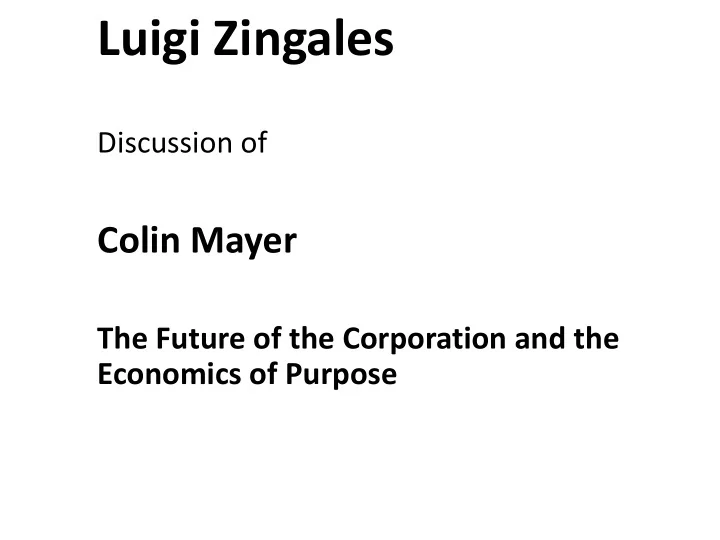

Luigi Zingales Discussion of Colin Mayer The Future of the Corporation and the Economics of Purpose
• Colin has a very ambitious goal in this paper: to reinvent capitalism • He raises three important points I agree with 1. Corporate governance is crucial in shaping the capitalism system 2. Friedman’s “doctrine” is outdated https://promarket.org/2020/10/13/milton-friedman-legacy- doctrine-theorem/ 3. People are not motivated only by money. A corporate purpose can be an important motivating factor • In spite of this agreement, I find this paper very difficult to discuss.
• Faced with the problems of today’s capitalism Colin responds with a mantra: Companies should “produce profitable solutions to the problems of people and planet, not profit from producing problems for people or planet” • Is this • a moral precept for the individuals? • a managerial guide to improve how companies are run? • a policy prescription for corporations?
Moral precept? • If it is a moral precept, I do prefer Kant’s one: “Act only according to that maxim by which you can at the same time will that it should become a universal law” • It does not require the definition of • “profitable” solution • problems of people and planet
Managerial Guide? • As economists we look at trade-off along the PPF. • Managerial scholars study how to move that frontier • Is Colin arguing that his approach moves the PPF? • That maximizes firms’ value (ignoring externalities)? • If so, why entrepreneurs and VCs do not choose it? • In the past the choice might have been limited • But now there is the Public Benefit corporation • Why even businesses with an explicit social goal in mind choose the traditional form of corporation?
Policy Prescription? 1. Why is this limited just to corporations? 2. Is it feasible? 3. What are the implicit risks?
1. Why is this limited just to corporations? • Corporations do enjoy an “exorbitant privilege”: limited liability vis-à-vis tort claimants • If Colin’s focus was on this type of externalities and only these, his conclusion would make perfect sense. • But if you are concerned about global warming, inequality, racism, etc. not obvious limited partnerships are any better • So why do you want to mandate a social purpose only for the corporate form?
2. Is It Feasible? • Craiglist Example: • “Promoting trustworthy journalism, including the ethics of news distribution to deny the amplification of disinformation. • Protecting voting rights and the election from foreign and domestic interference.” • Djourelova et al. (2020) look at the effects of Craiglist entry on local news and political market • Reduction in newspaper circulation and newsroom workforce • Staff cuts affect both managerial and editorial positions • Changes in news content and editorial priorities (i.e, less politics, especially local) • Local voters less likely to get informed and to turnout in elections • Evidence of elected officials becoming more extreme and less responsive to local constituents • Is CL producing profitable solutions or profiting from producing problems? • In general how can we tell?
3. Possible Risks • Colin defines (traditional) capitalism as being an economic system of private ownership of the means of production and its operation for profit. • For me capitalism is essential “freedom of enterprise” • The traditional means of productions can be leased • The organization can have other goals • The essential element is freedom of incorporation • By introducing a mandatory social purpose, the proposal introduces a mandatory screening (done by whom?) about what is social and what it is not • It is the end of the freedom of enterprise and the end of capitalism as we know
A Bad Example • Novo Nordisk in a triopoly that controls 96% of the insulin market • Between 2001 and 2017 the price of vial of the short-acting insulin increased from $35 to $270 (671%) • Between 1987 and 2014, the wholesale price of a 20-ml vial of long-acting insulin increased from $170 to $1400 (724%)
• Is Novo Nordisk cross subsidizing customers in developing from pricing in developed countries or is it price discriminating to maximize its profits (selling corporate responsibility as an excuse)? • Suppose it is cross subsidizing, whose objective function is it maximizing? • Why should we buy into this corporate socialism a la Robin Hood?
Warning “The proposal of any new law or regulation which comes from [businessmen], ought always to be listened to with great precaution, and ought never to be adopted till after having been long and carefully examined, not only with the most scrupulous, but with the most suspicious attention. It comes from an order of men, whose interest is never exactly the same with that of the public, who have generally an interest to deceive and even to oppress the public, and who accordingly have, upon many occasions, both deceived and oppressed it. Adam Smith, An Inquiry into the Nature and Cause of the Wealth of Nations, vol. 1, pt. xi, p.10 (1776)
Recommend
More recommend